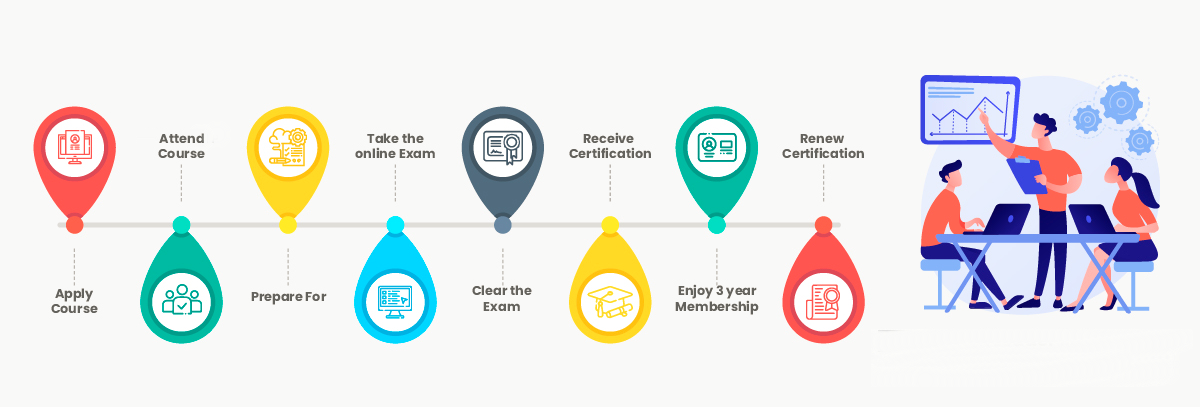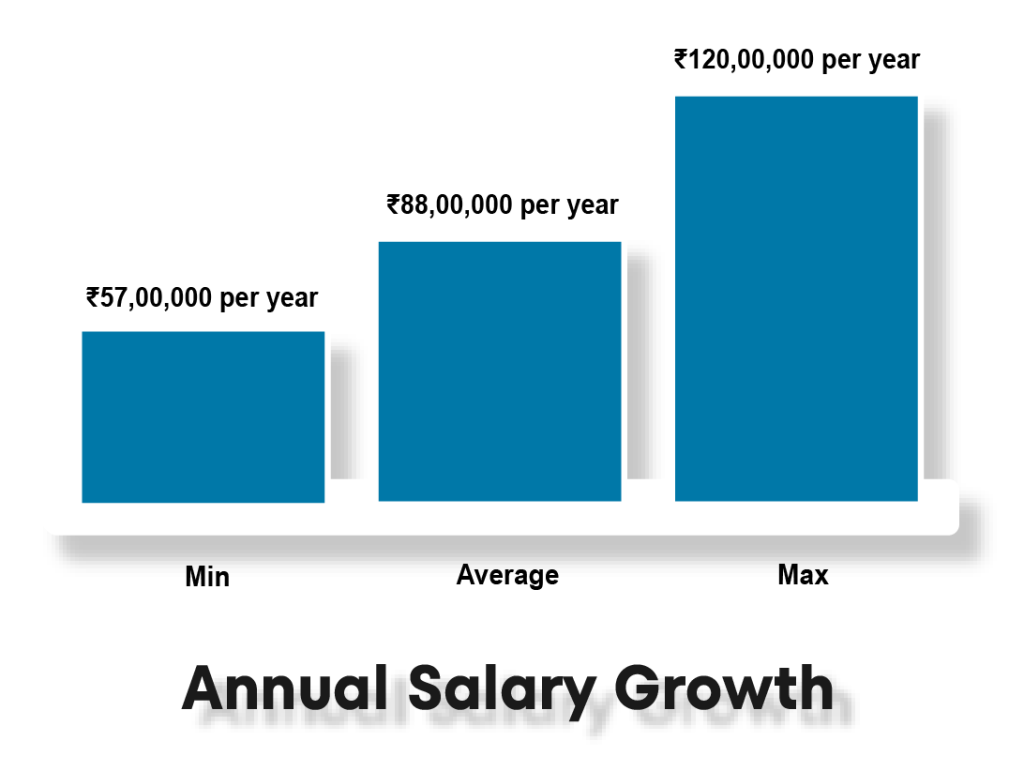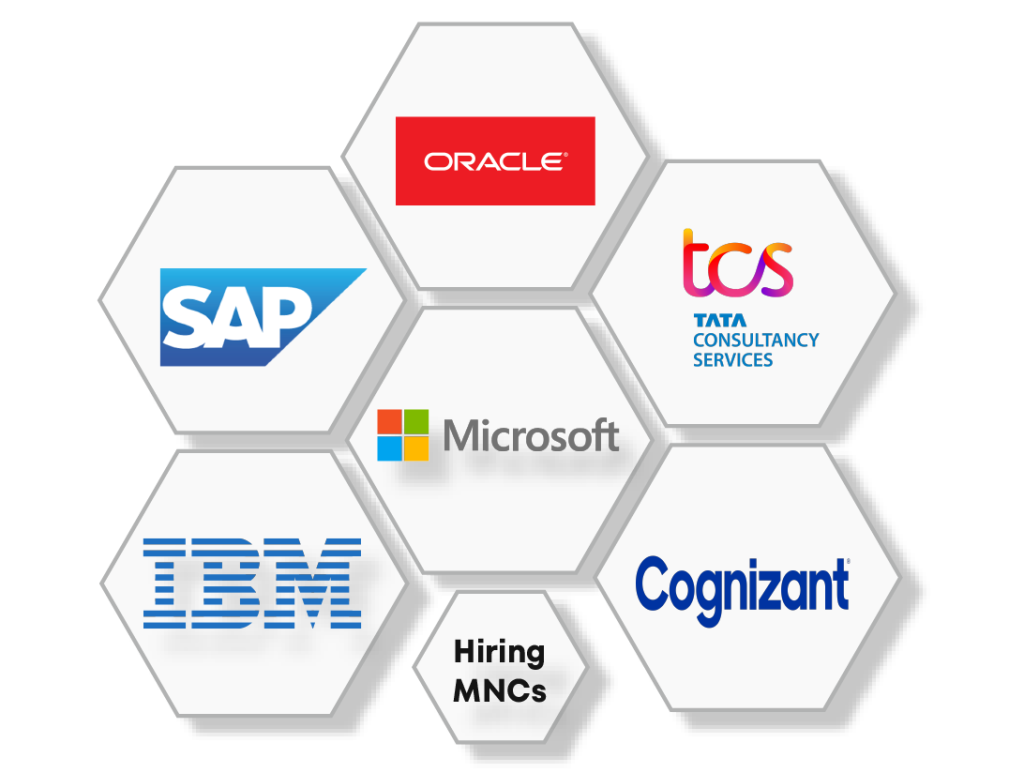
Sambodhi and Education Nest provide a MongoDB certification course that equips you with the necessary skills to succeed in database management. The program covers essential concepts such as data modeling, ingestion, query, sharding, and data replication with MongoDB. Additionally, you will acquire proficiency in MongoDB configuration, backup methods, and monitoring and operational strategies. MongoDB is a widely used open-source database that leverages a document format, offering unparalleled speed and flexibility. The training curriculum encompasses MongoDB’s introduction, installation, configuration, indexing, security, and maintaining its environment. MongoDB’s free schema design allows for the easy and efficient storage and use of data. By enrolling in Sambodhi and Education Nest’s MongoDB course, you can master this database management system and enhance your career prospects.
Application Deadline: Jun 30, 2023
Upskill for Your Dream Job
Sambodhi and Education Nest offer a comprehensive MongoDB Training Course designed to equip participants with the skills needed to become proficient in working with MongoDB, a popular NoSQL database. This live project-based training program provides hands-on experience in MongoDB, enabling learners to gain practical insights into data modeling, querying, indexing, and administration. With a team of experienced industry experts with over 10 years of experience, our instructors have developed unique teaching styles to ensure effective learning. Participants will learn key concepts such as document-oriented data modeling, CRUD operations, aggregation framework, and scaling strategies. Join us to master the skills and knowledge required to work with MongoDB, and enhance your career prospects in the field of data management and analysis.



Instructor-led MongoDB live online Training Schedule
May 15th – Weekend
July 1st – Weekend
Why enroll for MongoDB Certificate Training Course?


The demand for MongoDB professionals is projected to grow significantly, with a steady increase in job postings on platforms like Indeed and Glassdoor.

MongoDB professionals are in high demand across industries and MNCs, with finance, healthcare, e-commerce, and technology sectors, including renowned companies like Google, eBay, and PayPal.

According to Payscale, MongoDB professionals in the US earn an average salary of $108,000 per year, ranging from $70,000 to $150,000.
MongoDB Training Course Benefits
MongoDB courses offer numerous benefits. MongoDB is a highly popular database management system, adopted by the top organizations worldwide, including renowned companies such as Adobe, Google, Cisco, PayPal, and Verizon. MongoDB’s NoSQL document-oriented features make it an ideal solution for startups seeking a fast and scalable option. By obtaining a MongoDB certificate, learners can acquire job-specific skills, significantly improving their chances of landing a job in the domain with a competitive salary package. The training covers crucial topics ensuring learners become job-ready and experts in the field. Every year, the demand for skilled candidates is constantly increasing in this domain.

Annual Salary

Hiring Companies
Want to become a MongoDB Professional?
Why MongoDB Certificate Training Course from Education Nest






MongoDB Skills Covered
MongoDB Training Course Syllabus
MongoDB Training Projects

MongoDB projects in the retail industry have revolutionized the way businesses handle data and engage with customers. Retail companies leverage MongoDB's flexibility and scalability to manage vast amounts of customer information, including profiles, purchase history, and preferences. MongoDB facilitates real-time inventory management, enabling accurate stock updates and seamless order processing. By integrating MongoDB with recommendation engines, retailers can provide personalized product suggestions, enhancing the customer experience. Furthermore, MongoDB's geospatial capabilities enable retailers to optimize logistics and track deliveries efficiently. With its ability to handle high transaction volumes and complex data models, MongoDB empowers the retail industry to drive operational efficiency, improve customer satisfaction, and make data-driven decisions for business growth.

MongoDB projects play a vital role in the IT industry, offering diverse opportunities for data management and application development. Organizations leverage MongoDB to build scalable, flexible, and high-performance solutions. MongoDB projects involve tasks such as data modeling, designing efficient database schemas, implementing complex queries, aggregations, and indexing strategies. MongoDB's document-oriented structure enables seamless handling of unstructured and semi-structured data, making it ideal for handling large volumes of data. These projects span various domains including e-commerce, social media, healthcare, finance, and more. With its ability to handle real-time data, distributed systems, and horizontal scalability, MongoDB empowers businesses to create innovative applications, improve data analytics, and enhance user experiences in the dynamic IT landscape.
MongoDB Training Description
The MongoDB Training course is a comprehensive program offered by Sambodhi and Education Nest that aims to equip participants with the necessary skills to work with MongoDB, a popular NoSQL database. This training program covers key concepts and practical aspects of MongoDB, including data modeling, querying, indexing, aggregation, and administration. Participants will gain hands-on experience through live project-based training, allowing them to apply their knowledge in real-world scenarios. The course is led by experienced industry experts who have extensive knowledge and expertise in MongoDB. By completing this training, participants will acquire the skills needed to become proficient MongoDB professionals, opening up opportunities for career growth in data management and analytics.
The objectives of the MongoDB course are as follows:
Learning MongoDB offers several compelling reasons and benefits:
Scalability and Flexibility: MongoDB is designed for scalability, allowing applications to handle large amounts of data and high user loads. Its flexible document-oriented data model makes it easy to adapt and evolve schemas as business requirements change.
NoSQL Database: As a leading NoSQL database, MongoDB provides a non-relational approach to data storage, enabling efficient handling of unstructured and semi-structured data. It offers flexibility in data modeling and allows for faster development cycles.
High Performance: MongoDB’s architecture and indexing capabilities enable fast data retrieval, making it suitable for real-time applications and analytics. Its distributed database approach ensures horizontal scalability and fault tolerance.
Agile Development: MongoDB integrates well with agile development methodologies, facilitating iterative and rapid application development. It allows for seamless schema changes, reducing development time and effort.
Versatility: MongoDB is widely adopted across industries, including e-commerce, finance, healthcare, and social media. By learning MongoDB, you gain skills that are in high demand and applicable to diverse domains.
Career Opportunities: With the increasing popularity of MongoDB, there is a growing demand for professionals skilled in its usage. Learning MongoDB can enhance your career prospects, opening doors to roles such as MongoDB developer, database administrator, or data engineer.
Open-Source Community: MongoDB has a vibrant and active open-source community, providing access to resources, documentation, and community support. This fosters continuous learning and collaboration.
Integration with Modern Technologies: MongoDB integrates well with modern technologies and frameworks, such as Node.js, Express.js, and AngularJS, allowing you to build full-stack applications and leverage the power of JavaScript.
Future Growth: As the need for handling big data and real-time analytics continues to grow, MongoDB’s relevance and adoption are expected to increase. Learning MongoDB equips you with skills aligned with future industry trends.
Personal and Professional Development: Learning MongoDB expands your knowledge and proficiency in database management and NoSQL technologies, making you a more versatile and valuable professional in the rapidly evolving IT industry.
The MongoDB course is beneficial for individuals from various fields who want to enhance their MongoDB abilities. This course is ideal for:
The pre-requisites for the MongoDB course are as follows:
Basic understanding of databases: Familiarity with fundamental concepts of databases, such as tables, documents, collections, and querying.
Knowledge of programming languages: Proficiency in at least one programming language, such as JavaScript, Python, or Java, to understand and implement code examples and interact with MongoDB.
Familiarity with JSON: Understanding of JSON (JavaScript Object Notation) and its structure, as MongoDB uses JSON-like documents for data storage.
Basic command line and shell usage: Comfortable working with command line interfaces and executing commands, as MongoDB involves interacting with the MongoDB shell and executing database commands.
Fundamental database concepts: Awareness of common database concepts like CRUD operations (Create, Read, Update, Delete), indexing, data modeling, and database normalization.
Knowledge of SQL (optional): While not mandatory, having familiarity with SQL and relational databases can provide a helpful foundation for understanding database concepts, although MongoDB follows a different data model.
In addition to the mentioned courses, Sambodhi and Education Nest offer a range of other niche courses to cater to diverse learning needs. Some of the notable courses include:
The MongoDB Training course is a comprehensive program offered by Sambodhi and Education Nest that aims to equip participants with the necessary skills to work with MongoDB, a popular NoSQL database. This training program covers key concepts and practical aspects of MongoDB, including data modeling, querying, indexing, aggregation, and administration. Participants will gain hands-on experience through live project-based training, allowing them to apply their knowledge in real-world scenarios. The course is led by experienced industry experts who have extensive knowledge and expertise in MongoDB. By completing this training, participants will acquire the skills needed to become proficient MongoDB professionals, opening up opportunities for career growth in data management and analytics.
The objectives of the MongoDB course are as follows:
Learning MongoDB offers several compelling reasons and benefits:
Scalability and Flexibility: MongoDB is designed for scalability, allowing applications to handle large amounts of data and high user loads. Its flexible document-oriented data model makes it easy to adapt and evolve schemas as business requirements change.
NoSQL Database: As a leading NoSQL database, MongoDB provides a non-relational approach to data storage, enabling efficient handling of unstructured and semi-structured data. It offers flexibility in data modeling and allows for faster development cycles.
High Performance: MongoDB’s architecture and indexing capabilities enable fast data retrieval, making it suitable for real-time applications and analytics. Its distributed database approach ensures horizontal scalability and fault tolerance.
Agile Development: MongoDB integrates well with agile development methodologies, facilitating iterative and rapid application development. It allows for seamless schema changes, reducing development time and effort.
Versatility: MongoDB is widely adopted across industries, including e-commerce, finance, healthcare, and social media. By learning MongoDB, you gain skills that are in high demand and applicable to diverse domains.
Career Opportunities: With the increasing popularity of MongoDB, there is a growing demand for professionals skilled in its usage. Learning MongoDB can enhance your career prospects, opening doors to roles such as MongoDB developer, database administrator, or data engineer.
Open-Source Community: MongoDB has a vibrant and active open-source community, providing access to resources, documentation, and community support. This fosters continuous learning and collaboration.
Integration with Modern Technologies: MongoDB integrates well with modern technologies and frameworks, such as Node.js, Express.js, and AngularJS, allowing you to build full-stack applications and leverage the power of JavaScript.
Future Growth: As the need for handling big data and real-time analytics continues to grow, MongoDB’s relevance and adoption are expected to increase. Learning MongoDB equips you with skills aligned with future industry trends.
Personal and Professional Development: Learning MongoDB expands your knowledge and proficiency in database management and NoSQL technologies, making you a more versatile and valuable professional in the rapidly evolving IT industry.
The MongoDB course is beneficial for individuals from various fields who want to enhance their MongoDB abilities. This course is ideal for:
The pre-requisites for the MongoDB course are as follows:
Basic understanding of databases: Familiarity with fundamental concepts of databases, such as tables, documents, collections, and querying.
Knowledge of programming languages: Proficiency in at least one programming language, such as JavaScript, Python, or Java, to understand and implement code examples and interact with MongoDB.
Familiarity with JSON: Understanding of JSON (JavaScript Object Notation) and its structure, as MongoDB uses JSON-like documents for data storage.
Basic command line and shell usage: Comfortable working with command line interfaces and executing commands, as MongoDB involves interacting with the MongoDB shell and executing database commands.
Fundamental database concepts: Awareness of common database concepts like CRUD operations (Create, Read, Update, Delete), indexing, data modeling, and database normalization.
Knowledge of SQL (optional): While not mandatory, having familiarity with SQL and relational databases can provide a helpful foundation for understanding database concepts, although MongoDB follows a different data model.
In addition to the mentioned courses, Sambodhi and Education Nest offer a range of other niche courses to cater to diverse learning needs. Some of the notable courses include:
MongoDB Certificate Training Course reviews
Read learner testimonials
Radhika C.
The course was great. The support team were very helpful in clearing my doubts. Whenever there is any doubt, the support team will clarify it within 24 hours. Impressive project works and assignments.
Manikanta S.
I would like to express my gratitude to Sambodhi and Education Nest for the MongoDB course. The detailed explanations provided helped me grasp new concepts, and I feel much more confident in my understanding of MongoDB. Thank you for the valuable learning experience.
Abhishek M.
Sambodhi and Education Nest impressed me with their extensive knowledge and ability to address a wide range of questions and topics in a clear and concise manner. The inclusion of real-world scenario examples during the explanations greatly assisted me in acing technical interviews at reputable MNCs. Their expertise proved invaluable in preparing me for success.
Hear from our learners
Lorem ipsum dolor sit amet, consectetur adipiscing elit. Ut elit tellus, luctus nec ullamcorper mattis, pulvinar dapibus leo.
Lorem ipsum dolor sit amet, consectetur adipiscing elit. Ut elit tellus, luctus nec ullamcorper mattis, pulvinar dapibus leo.
Lorem ipsum dolor sit amet, consectetur adipiscing elit. Ut elit tellus, luctus nec ullamcorper mattis, pulvinar dapibus leo.
Like what you hear from our learners?
Creating Epic Presentations: Communicating Powerful Ideas reviews
MongoDB Training FAQs
If you miss an online MongoDB Training class, it’s important to reach out to the instructor or the support team of the online training platform you are using. They may be able to provide you with a recording or transcript of the missed class, so that you can catch up on what you missed. Alternatively, some platforms offer on-demand access to class materials, so you can go back and review the content on your own time. It’s always a good idea to try and make up the missed material as soon as possible, so that you don’t fall behind in your learning.
If you have queries after completing an online MongoDB Training course, Education Nest training platforms offer some form of post-course support. This may include access to a dedicated support team, a community forum where you can ask questions and connect with other learners, or even one-on-one sessions with an instructor or coach. If you have specific questions or concerns related to the course material, you can reach out to the instructor directly or use the support channels provided by the platform. It’s always a good idea to clarify any doubts or questions you may have, as this will help to solidify your understanding of the material and ensure that you can apply what you’ve learned in a real-world context.
MongoDB is a popular and widely used NoSQL database management system. It is designed to handle and store large volumes of unstructured and semi-structured data, such as JSON-like documents. MongoDB uses a flexible and scalable document-oriented data model, where data is stored as documents in collections. It allows for dynamic schema design, enabling easy adaptation to changing data requirements. MongoDB offers various features, including horizontal scalability, high availability, automatic sharding, and replication. It provides powerful querying capabilities, indexing options, and supports advanced data manipulation operations. MongoDB is favored for its ability to handle real-time applications, big data, and distributed computing environments.
The timing of when you get access to learning content after signing up for an online MongoDB Training course will depend on the specific training platform you are using. In most cases, you should receive access to the learning content immediately upon signing up, or shortly after your payment has been processed. Some platforms may require you to complete an enrolment process or set up an account before you can access the content. It’s always a good idea to check the specific details of the course or platform you are using, as the timing and process may vary. If you are experiencing any issues accessing the learning content, you should contact the support team of the training platform for assistance.
Once you enrol in MongoDB Training course, you will typically have access to the course material for as long as the course remains available on the platform. This means that you can revisit the material at any time, even after you have completed the course, and continue to learn and improve your skills. The benefit of lifetime access to the learning material is that it allows you to learn at your own pace and on your own schedule. You can review the content as many times as you need to fully understand the concepts and techniques covered in the course. Additionally, if you encounter a new challenge in your work or personal life, you can go back to the course material to find solutions and strategies to help you overcome the challenge. Having access to course material for a lifetime is a valuable benefit, as it allows you to continue to improve your skills and knowledge long after you have completed the course. So, if you are interested in improving your Communication skill, build confidence and want the flexibility to learn at your own pace, consider enrolling in MongoDB Training course that offers lifetime access to the learning material.
If you miss an online MongoDB Training class, it’s important to reach out to the instructor or the support team of the online training platform you are using. They may be able to provide you with a recording or transcript of the missed class, so that you can catch up on what you missed. Alternatively, some platforms offer on-demand access to class materials, so you can go back and review the content on your own time. It’s always a good idea to try and make up the missed material as soon as possible, so that you don’t fall behind in your learning.
If you have queries after completing an online MongoDB Training course, Education Nest training platforms offer some form of post-course support. This may include access to a dedicated support team, a community forum where you can ask questions and connect with other learners, or even one-on-one sessions with an instructor or coach. If you have specific questions or concerns related to the course material, you can reach out to the instructor directly or use the support channels provided by the platform. It’s always a good idea to clarify any doubts or questions you may have, as this will help to solidify your understanding of the material and ensure that you can apply what you’ve learned in a real-world context.
MongoDB is a popular and widely used NoSQL database management system. It is designed to handle and store large volumes of unstructured and semi-structured data, such as JSON-like documents. MongoDB uses a flexible and scalable document-oriented data model, where data is stored as documents in collections. It allows for dynamic schema design, enabling easy adaptation to changing data requirements. MongoDB offers various features, including horizontal scalability, high availability, automatic sharding, and replication. It provides powerful querying capabilities, indexing options, and supports advanced data manipulation operations. MongoDB is favored for its ability to handle real-time applications, big data, and distributed computing environments.
The timing of when you get access to learning content after signing up for an online MongoDB Training course will depend on the specific training platform you are using. In most cases, you should receive access to the learning content immediately upon signing up, or shortly after your payment has been processed. Some platforms may require you to complete an enrolment process or set up an account before you can access the content. It’s always a good idea to check the specific details of the course or platform you are using, as the timing and process may vary. If you are experiencing any issues accessing the learning content, you should contact the support team of the training platform for assistance.
Once you enrol in MongoDB Training course, you will typically have access to the course material for as long as the course remains available on the platform. This means that you can revisit the material at any time, even after you have completed the course, and continue to learn and improve your skills. The benefit of lifetime access to the learning material is that it allows you to learn at your own pace and on your own schedule. You can review the content as many times as you need to fully understand the concepts and techniques covered in the course. Additionally, if you encounter a new challenge in your work or personal life, you can go back to the course material to find solutions and strategies to help you overcome the challenge. Having access to course material for a lifetime is a valuable benefit, as it allows you to continue to improve your skills and knowledge long after you have completed the course. So, if you are interested in improving your Communication skill, build confidence and want the flexibility to learn at your own pace, consider enrolling in MongoDB Training course that offers lifetime access to the learning material.
Be future ready, start learning